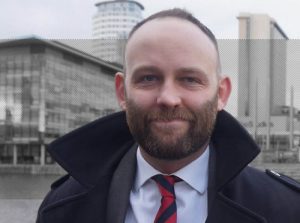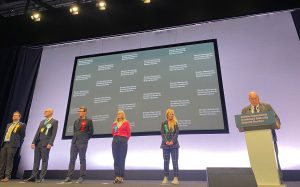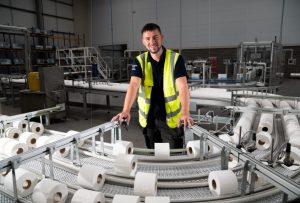Now or never for Salford Red Devils as Rugby League readies for a revolution

Salford Red Devils Rugby League Club believe they can make a breakthrough to become one of the elite clubs in the sport, with a community ownership model, but need Council backing to take their stadium into public ownership.
A successful crowdfunding campaign raised £364,270 to set the Red Devils on course, but executives have told TheBusinessDesk.com that a grading system for the sport makes secure tenure at the AJ Bell stadium an urgent necessity.
When the 12,000 capacity stadium was built in 2012 to replace Salford Red Devils’ traditional ground The Willows it was as a joint venture between Salford City Council and Peel. Now Peel wants out after appearing to have failed to develop the surrounding site, despite its close proximity to the ever growing leisure facilities at the nearby Intu Trafford Centre, and having the more popular Rugby Union club Sale Sharks in as tenants, albeit not always happy ones.
Salford’s problems aren’t unique to them in the turbulent world of professional Rugby League. A radical overhaul of the structure of the British sport has been outlined by American-based global sports entertainment and media company IMG, which entered into a 12-year strategic partnership with the RFL in 2022.
In March 2023, IMG proposed new grading criteria to the RFL Council — based on both on-field and off-field standards — to determine the league in which clubs would play.
The intention was to professionalise the commercial side of the sport by focusing on fan engagement and boosting investment through sponsorship, television deals, e-commerce and technology.
The IMG plan, which clubs agreed in May would end promotion and relegation and additional criteria such as stadium, community reach and fanbase therefore calculating a weighting to decide which clubs competed in which division.
Salford’s problem is both the ownership of the club, and their stadium.

Paul Dennett
Salford City Council’s avowedly socialist Mayor Paul Dennett believes in the principle of public ownership of infrastructure and assets and wants to acquire the stadium, a plan the club supports.
Dennett told the I Love Manchester website that principle drives his actions on this issue, and others.
“That’s why we’re building council houses again,” he said. “The market fundamentally has failed. The role of local government for me isn’t just about commissioning and contracting services from the market. It’s actually about actively delivering those yourself directly, in Salford – in-sourcing.
“It’s also not about just flogging off land and property to deal with the impact of Tory austerity or to facilitate market growth, which are increasingly international global phenomena.
“We also want to ensure that we protect our civic institutions. And I would argue that one of them is Salford Red Devils.”
Critics of the plan say Salford City Council should consider alternatives, such as an outright private sale, or revive a plan for a swap deal for the Rugby League club to move to the Peninsula Stadium in Kersal, currently the home of Gary Neville’s Salford City Football Club, playing in EFL League Two.
For Paul King, the managing director of Salford Red Devils, that would be a disaster, particularly given the IMG criteria.
“Salford Red Devils moving to the Peninsula Stadium entirely places our Super League Status at risk, the risk would be a loss of Super League distributions at £1.5m per annum which in turn would likely liquidate the club or at the least make the club part time and commence a slow death spiral out of existence.
“Within the IMG stadium criteria, the current Peninsula Stadium would fail to meet the minimum Super League IMG criteria on a number of bases, including minimum capacity, pitch size and slope, sponsor facilities, broadcasting and photographer facilities, floodlighting and seating percentage to name but a few.”
He said the club spent “time and money” surveying the location but identified a cost of £8m to meet the standard without taking into consideration the poor local infrastructure and the impact on the surrounding area.
“Salford City FC receive complaints from residents about access and egress of their 1800 average attendances, we had 7800 for the game v Wigan recently, I can only imagine the negative impact of that volume leaving the stadium on local residents,” he added.
At the heart of the row is the small Conservative opposition on Salford City Council vehemently opposing Dennett’s stance and has moved over the summer to successfully “call in” the council’s plan to buy the AJ Bell Stadium from Peel with “money they council hasn’t got”.

Cllr Robin Garrido
Speaking to TheBusinessDesk.com this week, Cllr Robin Garrido said the Salford Red Devils need to repay loans to the council and suggested the club may not be suited for Super League with such a small fanbase.
“Paul Dennett believes in a socialist state owning public buildings. He complains the Council has no money and is suffering from austerity.
“I say the money would be better spent on repairing pot holes in the roads and on community facilities.”
He added: “Salford Red Devils Rugby League club need to get their own house in order and make the club self-supporting, they’ve had every opportunity to make themselves successful with a free stadium that is usually only a third full.”
Salford Red Devils board director Oli Randell thinks Garrido has missed the point and thinks the stadium is being used by the Conservative group of Councillors as a proxy ideology war against Paul Dennett and the Labour group.
“The background is that when the Salford Community Stadium (A J Bell) was built, it was a joint venture between Salford City Council and Peel. The business plan was to build the stadium and develop the parcels of land around the stadium that would be sold to cover the costs of the land purchase and stadium build,” he said.
He believes the development project around the stadium could be revived and be a success for the betterment of the club and the Salford City Council.
He told TheBusinessDesk.com the delay caused by “calling in” the Salford Community Stadium project for further scrutiny is causing significant financial hardship to Salford Red Devils, who he claims are unable to set prices for season ticket for 2024 which should already have been placed on sale.
“The current owners and management team of Salford Red Devils have been in place only for 4 years, during which COVID lockdowns devastated the revenues, fan engagement and commercial relationships in the first 3 years. In the past 12 months, and even more so since completing the Community Share Ownership placing, Salford Red Devils has demonstrated its commercial earning capability and thus sustainability as a business.”
He believes there’s a real threat now to the momentum from the Community Share Sale and significant gains in engagement and commercial interest that could be lost and would affect the club’s gradings.
Randell points to 6 new board members all with significant and relevant expertise that will help drive the business, commercial and community elements of the club forwards and provide a greater level of governance and can create significant health, well-being, education and crime prevention outcomes.

Paul King
Managing director Paul King also says he is “very optimistic” his commercial team can better utilise the stadium asset and achieve greater commercial outcomes with a future community ownership model.
“Salford Red Devils also pays a much greater share of Stadium costs than is attributed to us. This year we will bring more than 50,000 fans to the stadium who buy food and drink, and pay for match day parking. The same 50,000 fans and hundreds of thousand others when our games are televised will see the AO South Stand and other stadium fixed sponsor assets. All of these interactions create a revenue stream for the current stadium owners, and are not attributed to Salford Red Devils as ‘paying our way’.”
He refutes Cllr Garrido’s premise that the club has failed.
“The challenge we would make back to Cllr Garrido is that it is inappropriate to re-appraise the original stadium deal 12 years on, when the business case was for the development of the land to repay the costs of buying the land and developing the stadium.
“It is even more inappropriate to lay the land development challenges at the door of Salford Red Devils.”
These issues will be playing out across the North as Rugby League looks to the future and club’s outside of the traditional big six of Leeds, Warrington, Wigan, the Hull clubs and St Helens jostle for a spot in the big league.
The surprise package this season has been Leigh Leopards, winners of the Challenge Cup, and backed by colourful entrepreneur Derek Beaumont, and Catalan Dragons, from the south of France.

Catherine Forshaw
Sports law specialist Catherine Forshaw, at law firm Brabners, said the requirement on clubs to comply with the new rules could prove onerous.
“While the RFL is yet to detail all the information it needs, there may be a significant amount of administrative work required by clubs. This is likely to include properly audited financial accounts, business plans, information on the club’s foundation, fan engagement and details of scheduled stadium and facility repairs. Although the more abstract criteria may provide for more rigorous minimum standards, they may also necessitate even more data and information. Although the hope is that this will boost innovation and standards (resulting in increased investment), many smaller clubs may struggle to meet this administrative burden and cost,” she said.
What’s possibly unique about Salford is the socialist Mayor who seems firmly on board.








